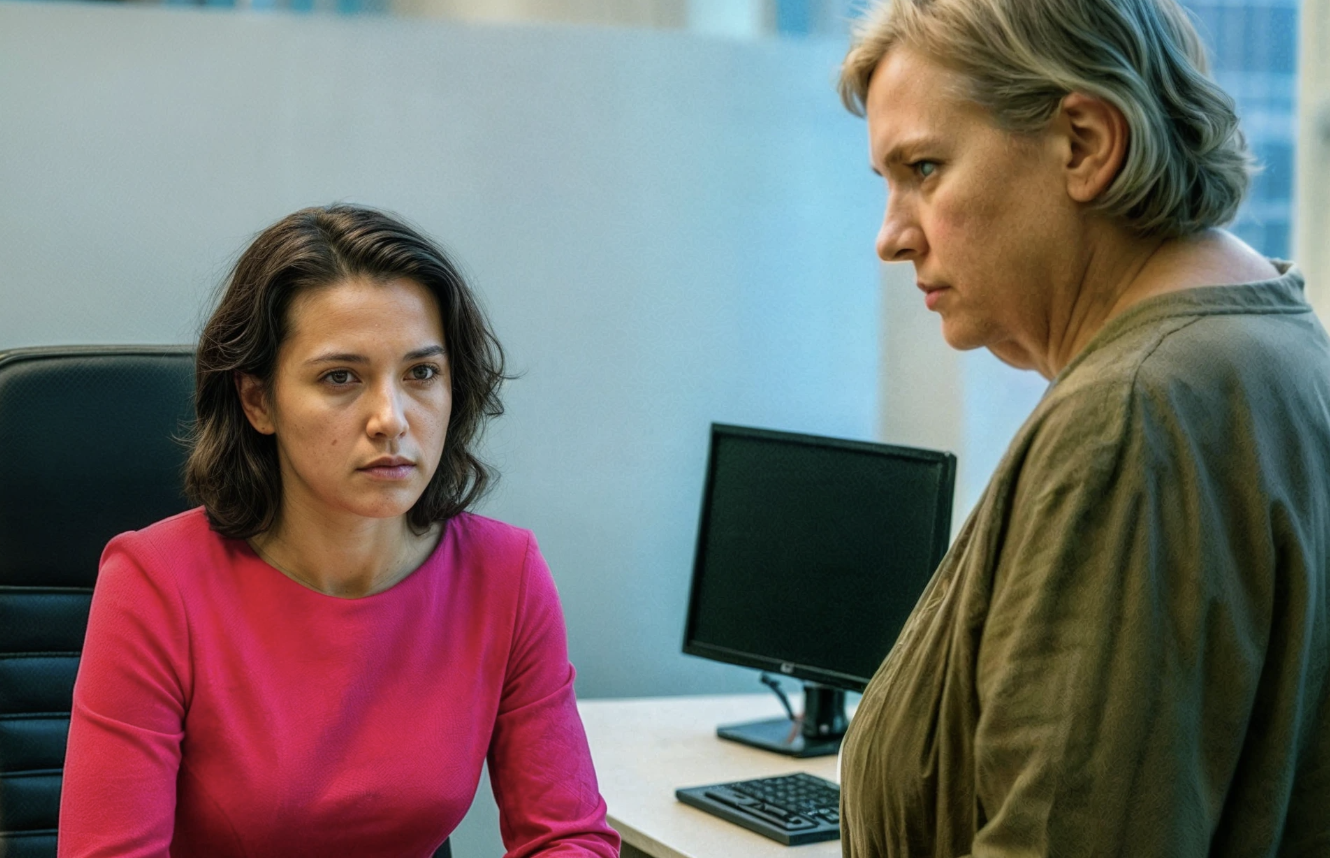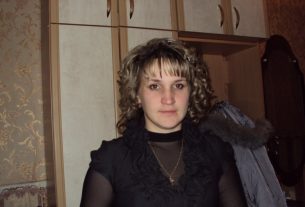Marina stood by the window of her twelfth-floor office, looking out at a city bathed in spring sunlight. Five years ago, she couldn’t even imagine that she would ever end up here— in a spacious office with floor-to-ceiling windows and a plaque on the door that read “Deputy Director for Development.” She couldn’t imagine she would feel alive again.
And yet there was a time when she stopped feeling like a person at all.
It didn’t start right away. The first two years of her marriage to Andrey seemed quite ordinary. They met at a party with mutual friends; he was charming, attentive, brought flowers, and made plans for the future. Marina worked at a large logistics company, had just been promoted, and dreamed of a career in the international department. Life was full of possibilities.
Everything changed after the wedding. At first, it was little things—Andrey asked her to have dinner ready earlier because his mother, Valentina Petrovna, was coming over and “wasn’t used to waiting.” Then her mother-in-law began showing up more often, staying longer, and each time she would find something that was “not right”: dust on a shelf, towels folded incorrectly, a tablecloth not starched enough.
“Marinka, you understand that a good wife should keep house,” Valentina Petrovna would say with a sweet smile that made Marina feel cold. “Andryusha is used to order. I raised him that way.”
A year later, Andrey suggested Marina quit.
“Why do you need that job?” he asked one evening when she came home close to ten after an important negotiation. “You come home tired, the house is a mess, no dinner. Find something simpler, closer to home. My salary is enough for us.”
Marina tried to object. She loved her job; she liked solving complex tasks, talking to partners, feeling her competence grow. But Andrey was adamant, and Valentina Petrovna backed her son.
“Sweetheart, a woman should be the guardian of the hearth,” she explained, sitting in their kitchen sipping tea. “A career is a man’s business. And look at you: dark circles, disheveled. What man can put up with that?”
Marina quit. She found work as an administrator in a small office near home—boring, monotonous, with a tiny salary. But now she had time to cook, clean, and iron Andrey’s shirts. It would seem everything should have fallen into place.
Instead, the demands grew.
Valentina Petrovna started “getting sick.” She suddenly developed back problems that kept her from washing floors. Then there were “heart issues,” which meant she couldn’t worry, and therefore Marina had to come to her apartment and clean so that her mother-in-law “wouldn’t be upset by the mess.”
“Mom is lonely, you understand,” Andrey said. “Is it so hard for you to go to her once a week?”
Once a week turned into twice, then three times. Marina spun like a squirrel in a wheel: work, home, mother-in-law, work again, cooking, laundry, cleaning. She fell asleep like the dead and woke up already exhausted. A stranger stared back at her from the mirror—dull skin, lifeless eyes, and an extra fifteen kilos that crept on unnoticed, thanks to grab-and-go snacks and evening stress-eating.
One day, walking past a boutique window, Marina saw a beautiful turquoise dress. It was elegant, fitted, made of flowing fabric that shimmered in the light. She went inside, tried it on, and suddenly saw a glimmer of her former self in the mirror.
“I’ll take it,” she told the salesperson.
At home Andrey made a scene.
“Have you lost your mind?” he shouted, shaking the receipt. “Five thousand on a rag? We have a family budget, for your information! That kind of money could buy groceries for a week!”
“It’s my salary,” Marina said quietly.
“Yours?” Andrey laughed. “What do you even make there? Pennies? I’m the primary breadwinner in this family, and I decide what we spend money on. Take the dress back.”
She took it back. The saleswoman looked at her with pity.
Marina began to suffocate. She would wake up at night with the feeling that the walls were closing in. Her life had turned into endless compliance with other people’s demands, with no room left for herself. She tried to remember the last time she did something for herself, met up with friends—and couldn’t. All of that belonged to some other life.
One evening, when Andrey once again reproached her for soup that wasn’t tasty enough, Marina said:
“I can’t live like this anymore.”
Silence fell.
“What do you mean?” Andrey asked slowly.
“I’m suffocating. I don’t feel human. I want to go back to a real job; I want to live, not just serve everyone around me.”
Andrey called his mother. Valentina Petrovna arrived within the hour.
They talked for a long time. They spoke in turns and together, talking over each other. Marina sat on the couch while they stood over her, and she felt herself growing smaller and smaller.
“Look at yourself,” Valentina Petrovna said with icy fury. “Do you think you have anywhere to go? You’re thirty-five, you’re fat, you don’t have proper experience for a good job, no money. Who would hire you?”
“Mom’s right,” Andrey chimed in. “Do you think anyone out there is waiting for you? Look around—everybody lives like this. It’s normal. You’re just spoiled, that’s all.”
“No one needs you,” the mother-in-law continued. “Andrey stays with you out of pity. Have you ever seen someone like you happy? You’ll be alone in a rented room, at some stupid job, growing old by yourself. That’s what awaits you.”
Marina listened and felt something shifting inside her. And along with that came a strange relief. Because in that moment she realized: even alone, in a rented room, at a stupid job, she would be better off than here.
“I’m leaving,” she said.
Valentina Petrovna paled.
“You’ll regret it,” she hissed. “You’ll crawl back on your knees, but the door will be closed.”
“I won’t crawl,” Marina replied, and went to pack her things.
The first months were hard. Marina rented a tiny studio on the outskirts, pinched every penny, lived on buckwheat and pasta. But every morning she woke up and, for the first time in years, felt she could breathe.
She called her old workplace. Luckily, her former supervisor, Sergey Viktorovich, was still there and remembered her well.
“Marina? My God, how many years!” he exclaimed, delighted. “Of course, come by. We’ve just opened a position for a client relations manager. Not as high as the one you had, but it’ll do for a start.”
Marina went back. Back to a world where she was valued for her knowledge and skills, where she could show initiative, where people consulted her and listened. She worked a lot, but it was a different kind of tiredness—not draining, but fulfilling.
She started going to the gym. Not to meet someone else’s standards, but because she liked the feeling of strength in her body. The kilos came off slowly but surely. She bought herself clothes—not expensive, but pretty, the kind she herself liked. She read books she’d been putting off for years. She met with friends. She learned to hear herself again.
A year later she was promoted. Six months after that—again. Work fascinated her; life filled with color.
And then one day in a staff meeting she noticed a new colleague in the marketing department. His name was Dmitry; he was calm, thoughtful, with kind eyes and a quiet laugh. They began to talk—first about work, then over coffee at lunch, then on walks after work.
Dmitry listened when she spoke. He didn’t just nod—he truly listened, asked questions, took an interest in her opinion. He admired her determination, her knowledge, her view of the world. With him, she felt like an interesting, valued person, not a servant.
“You’re amazing,” he would say. “There’s so much in you: intelligence, strength, depth. I could listen to you for hours.”
Marina fell in love. Not like she once had with Andrey—quickly and intoxicatingly—but slowly, reliably, deeply.
A year later they married. The wedding was small but very warm—just close friends and Dmitry’s parents, who welcomed Marina like a daughter. They first rented, then bought with a mortgage a lovely two-room apartment in a new building with high ceilings and big windows.
Marina became pregnant. When she told Dmitry, he cried from happiness. Their daughter, Sonya, was born—with her father’s eyes and her mother’s smile. And two years later came their son, Mark, noisy and curious.
Marina didn’t quit her job. Dmitry fully supported her decision to return from maternity leave early; they hired a nanny and split household duties evenly. In the evenings they read fairy tales to the children; on weekends they walked in the park, baked pizza, and played board games. It was the life Marina had not even dared dream of five years earlier.
And today, standing at her office window, she received a message from security: “Valentina Petrovna Sokolova is asking for you at reception. She said you know each other.”
Marina’s heart stopped for a moment. She hadn’t seen her former mother-in-law in five years. What did she want?
“Let her in,” she wrote back.
Valentina Petrovna entered the office ten minutes later. She had aged and grown thinner, with a stoop. But her eyes were the same—cold, appraising.
Her gaze slid over the spacious office, over Marina in a strict yet elegant suit, over the photo on the desk—a happy family against a seaside backdrop.
“So you’ve managed to settle in, it seems,” Valentina Petrovna said instead of a greeting.
“Hello, Valentina Petrovna,” Marina answered calmly. “Please, sit. Tea? Coffee?”
“No need.” The mother-in-law perched on the edge of the chair, continuing to study the office. “I searched for you for a long time. But I found you through mutual acquaintances.”
“Why were you looking for me?”
Valentina Petrovna was silent for a moment, and suddenly Marina understood. She saw it in the woman’s eyes—the hope of finding her miserable, degraded, pathetic. Confirmation of her own rightness. Proof that she’d been correct when she predicted a pitiful future for Marina.
“I just wanted to know how you’re living,” Valentina Petrovna said, but her voice quavered.
“I’m doing well,” Marina replied. “I’m working as deputy director at the same company I once left. I’m married to a wonderful man. We have two children—a five-year-old daughter and a three-year-old son.”
Valentina Petrovna turned pale.
“Children? You… But you were already thirty-five…”
“And now I’m forty. And I’m happy. Truly happy.”
“Andryusha never remarried,” the mother-in-law blurted out. “He lives with me. Says all women are mercenary, that it’s impossible to find a good one.”
Marina felt almost sorry for her. Almost.
“Valentina Petrovna, why did you really come?”
The woman was silent. Then suddenly she asked, and there was genuine bewilderment in her voice:
“How? How did you do it? You were unwanted, with no money, no prospects…”
Marina stood and walked to the window.
“Do you want to know the secret?” She turned to Valentina Petrovna. “Only a person who grows and develops can be happy—someone who doesn’t build themselves up by crushing those they can dominate. You spent your life trying to control Andrey, and then me. I chose growth—my own, and alongside someone who wants to grow with me.”
“But…” Valentina Petrovna looked at her almost with horror. “You were nobody…”
“I was always somebody. You just saw in me only what was convenient for you. A free housemaid, a nurse, a prop for your self-importance. But I was—and remain—a person. With dreams, abilities, and a right to happiness.”
Valentina Petrovna rose. Suddenly she looked very old and very alone.
“I thought…” She faltered. “I truly thought that was the right way. That that’s how it should be.”
“Do you know what’s saddest?” Marina said quietly. “If you had simply allowed me to be myself, if Andrey had seen a partner in me and not a maid—perhaps we would still be together. And everyone would be happy. But you chose control. And control and happiness are incompatible.”
“Valentina Petrovna.”
She turned at the doorway.
“You wanted to make sure I was unhappy, didn’t you?” Marina asked.
“You’re right. That’s exactly why I came. To make sure you were suffering. And you… you’re happy.”
“Yes,” Marina replied simply. “I’m happy. And I wish happiness to you and Andrey. But it will only come when you stop building it on other people’s misery.”
Valentina Petrovna nodded and left. Marina watched her go and returned to the window.
Down on the street, a young couple walked hand in hand, laughing at something. Five years ago, Marina looked at people like that with envy and despair, thinking happiness was something unattainable, meant only for others.
Now she knew: happiness is a choice. The choice to be yourself. The choice not to betray yourself. The choice to grow, not to shrink. And sometimes that choice requires enormous courage—the courage to leave when you’re told to stay, the courage to believe in yourself when everyone around insists you’re worth nothing.
Her phone buzzed on the desk. A message from Dmitry: “Picked up the kids from kindergarten. Sonya’s asking to bake an apple charlotte. Can you make it for dinner?”
Marina smiled and quickly typed back: “Leaving in an hour. I’ll buy apples on the way. Love you.”
She looked at the photo on the desk—at her real family, at her real life. That Marina—the one who was exhausted and suffocating five years ago—now seemed like someone else. But Marina remembered her. She remembered her despair and her courage. And she was grateful to her.
Because it was that Marina who, at the darkest moment of her life, found the strength to say, “I can’t live like this anymore.” And took the first step toward the light.
Outside, the spring sun poured golden light over the city, promising warmth, growth, and new life. Marina gathered her papers, shut down her computer, and headed out.
Home was waiting for her. Her real home, where she could be herself.



